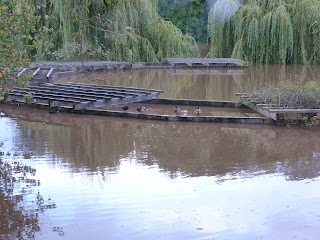And never more so as when Reg Christie and his wife Ethel moved down from Sheffield in the 1940s, to make a fresh start on their marriage after Reg had been AWOL for nine years, eventually turning up doing time for crimes unspecified. He claims Notting Hill is up and coming. But he's a big fat liar.
He's also a voyeur, a philanderer and a murderer. Strangely incongruous with the shuffling, mumbling, balding, bespectacled moper he appears to be. He is repressed with palpable tension, yet his morose, put-upon wife merely shrugs as she comes across yet another blood-stained mattress, or sees him digging a shallow grave next to a rosebush. It's so dark in the house thanks to the wartime black-out that it's hard to see or be sure of anything. There is an eerie atmosphere, threatening hallucination, uncertainty and death. Ethel gets cross if she finds Reg flirting with a prostitute or a lady visitor, but her anger soon collapses into terror when Reg finally lashes out, nearly strangling her over the kitchen sink. Ethel runs away to her brother's, but a niggling, pleading letter from Reg makes her return, only to find the coat of a missing woman hanging in the hall.
The story begins with a hanging too - and this man's story is still to be told. More next week.
The family in Back In Time to Brixton are later to arrive in Notting Hill, attending the carnival in 1999, the last year of their journey tracing the story of a typical Jamaican family in London arriving on the Windrush in 1948. Their first night in London is in even less desirable accommodation than Rillington Place (though at least it doesn't come with its own murderer) - an underground bunker near Clapham South tube station that had been used as an air raid shelter in the war. It's already equipped with rickety bunk beds and a bucket, which is all the authorities think people need. That and corned beef. Thankfully soon the family can move into a poky one-room bedsit, and then gradually work their way up through life and jobs in Brixton. But the struggles and attitudes the families faced in London, the xenophobia and mistrust, the outright abuse, make me wonder if Britain has learned nothing in the past sixty years. The tabloid headlines of the Sun in the sixties echo those of anti-migrant stance seen in the Mail and Express today. It's shocking, despicable and depressing.
The Irwins are as interesting and entertaining as the Robshaws last year, only a bit cooler, and definitely better dancers. The dad has even been on Gladiators. Brixton, like Notting Hill, has changed immeasurably since the arrival of the Windrush generation. At the far end of the Victoria Line, the tube station now blasts out classical music to keep the hooded teenage hoodlums away. It was a short bus ride from my house in Clapham, but I usually only ended up there to see a gig at the Academy (Belle and Sebastian, Starsailor, and James' great reformation in 2007) or a film at the Ritzy. I suppose I had my own prejudices: memories of the news footage of the riots in the 1980s, that the shops and bars were better (or at least more convenient) on my doorstep in Clapham, or that Brixton was just too busy.
And speaking of busy, 1999 was coincidentally the only year I went to the Notting Hill carnival. I had a lovely time eating jerk chicken and fried plantain at the street food stalls, listening to the steel bands, and cheering on the colourful floats and befeathered, whirling dancers. Such a fabulous, life-affirming, vibrant, energetic sight. Until I decided it was time to head home to Clapham and realised there was about a million people between me and the nearest open tube station; the entire million seemingly moving in the opposite direction to me. The crowds meant I never could face going back. But it was fun while it lasted.


























